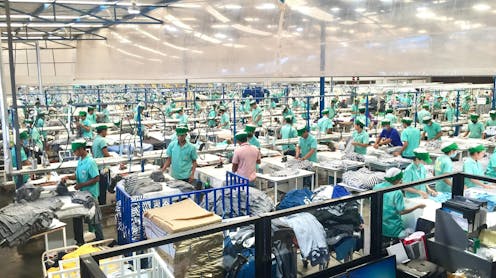poor workers in countries like Cambodia will be among the biggest losers
- Written by Sabina Lawreniuk, Principal Research Fellow, University of Nottingham

Politicians and economists have been pretty vocal in their response to the ongoing saga of Donald Trump’s tariffs. But much less has been heard from the world’s poorest workers about how they will be affected.
For when the US president first set out his reciprocal tariffs[1] – later paused for 90 days – some of the highest rates were for countries like Vietnam (46%), Bangladesh (37%) and Cambodia (49%).
These are places that make huge amounts of the clothes we wear, and even the reduced 10% tariff could be a big blow to their economies – and the people who depend on them.
Because aside from the well known sweatshop conditions[2] suffered by many workers in these places, brands and manufacturers often offset new costs by passing them on to workers in the form of lower wages and higher demands.
This phenomenon, sometimes referred to as “social downgrading”[3], was seen during the pandemic[4], when garment workers around the world faced mass layoffs[5] and even worse working conditions[6] to protect corporate profits when consumer demand decreased.
And those working conditions are already challenging. The minimum wage for one of Cambodia’s 1 million[7] garment workers (from a total population of 16 million) is just US$208[8] (£155.50) per month.
Around 80%[9] of those workers are women, whose wages[10] often support children and elderly parents, who don’t have the security of a state pension safety net.
It is these workers and their families who may end losing the most in Trump’s trade war. But they are used to geopolitics affecting their everyday lives, having suffered the impact of tariffs fairly recently – from the EU.
In 2020, Cambodia’s duty-free, quota-free access to the EU market (usually granted to developing countries) was partially revoked[11] as a punitive response to human rights concerns. Tariffs averaging 11%[12] were added to some product lines, mostly clothing and footwear, which covered about 20% of Cambodia’s total exports to the EU.
The Cambodian government immediately responded[13] by cutting public holidays and workplace benefits to try offset any increase in costs.
It has since slowed the rate[14] of minimum wage growth to below inflation. Both actions slashed real wages and made the challenge of economic survival even harder for those who depend on the industry.
Now, as Trump’s latest tariffs take hold – even at the lower rate of 10% – many garment and footwear industry workers will fear for their jobs.
But even those “lucky” enough to keep them will face mounting pressures to produce more, and more quickly, to offset rising costs – at the direct expense of their own financial security and wellbeing.
The idea that tariffs will ultimately bring jobs back to the US[15] ignores that fact that these jobs – precarious, underpaid and frequently dangerous[16] – are not the kind of jobs that any American would want.
And the evidence suggests that if even if they did want them, international manufacturing supply chains are more deeply embedded than people might think.
After the EU imposed its tariffs on Cambodia for example, brands could have looked to circumvent those added costs by relocating production. As it turned out, the volume of trade[18] between Cambodia and the EU has remained steady since – because sometimes there’s no alternative.
With Cambodia, companies have not been willing or able to shift production to competitors like Bangladesh, Myanmar or Sri Lanka, partly due to the political volatility in those countries.
Added to this is the fact that clothes production has become highly specialised geographically[19]. Cambodia’s distance from the EU means it focuses mainly on seasonal fashion “basics” such as T-shirts and knitwear.
Closer countries like Turkey and Morocco concentrate on the latest fast fashion trends, as their shorter shipping routes mean they can be quicker to respond to changing tastes.
It is not that easy to unsettle the systems and markets that are already in place.
As a result, in the global garment industry at least, Trump’s tariffs may not trigger a complete restructuring of the world’s supply chains. In the short term, they are instead likely to cause great uncertainty, reducing investors’ appetite for long-term planning, and reducing their confidence.
Orders may slow and prices may rise. And Cambodians making the world’s T-shirts and trainers will face even more pressure on their wages and working conditions.
References
- ^ his reciprocal tariffs (theconversation.com)
- ^ sweatshop conditions (www.earthday.org)
- ^ “social downgrading” (www.bloomsbury.com)
- ^ during the pandemic (www.researchgate.net)
- ^ mass layoffs (www.refashionstudy.org)
- ^ working conditions (www.tandfonline.com)
- ^ 1 million (rbh-eurochamcambodia.com)
- ^ US$208 (cambojanews.com)
- ^ 80% (rbh-eurochamcambodia.com)
- ^ whose wages (www.researchgate.net)
- ^ partially revoked (ec.europa.eu)
- ^ 11% (www.just-style.com)
- ^ immediately responded (www.rfa.org)
- ^ rate (cambodianess.com)
- ^ bring jobs back to the US (www.cnbc.com)
- ^ dangerous (cleanclothes.org)
- ^ PX Media/Shutterstock (www.shutterstock.com)
- ^ volume of trade (www.phnompenhpost.com)
- ^ highly specialised geographically (papers.ssrn.com)







